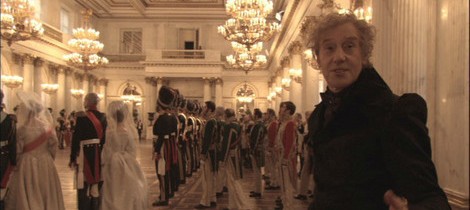by Monika Cooper
Russian Ark feels a little bit like “Rosencrantz and Guildenstern are Dead.” You follow two characters—crusty old Europe and the unseen man behind the camera—through rich scenes from Russia’s history. They edge along the margins of the action, eavesdropping on the great. They move from room to room, creating a sense of rambling, inexhaustible space, full of twists and surprises. Time itself branches and shimmers in the halls and corridors of the Hermitage.

You may not recognize all or any of the historical events alluded to. It is in part a film about amnesia. What you overhear in murmurs and whispers, though, may awake your curiosity about the sleepy, sprawling form that covers so much of our globe. But the film is not wasted even on a viewer without knowledge of Russian history. It leads the eye along the dimensions of beautiful spaces and lets it linger over moving works of art.
At one point in the film, you will encounter a young man. He likes to look at a painting of Saint Peter and Saint Paul, although he is not a reader of the Scriptures. Old Europe scoffs and rails at him—rightly, perhaps. It has been said that Russia makes image, rather than text, the repository of the meaningful. It has also been suggested that its reliance on image made Russia particularly vulnerable to destructive ideas from the West; the people had no habit of logical thought with which to evaluate them. But the young man knows something about Peter and Paul, even without Bible study. He knows they were good, holy. He doesn’t just register this and move on to the next statement. He lingers with the El Greco, for a long bath in their holiness.
As a viewer of this film, I feel like that young man. I feel rebuked for my ignorance and yet I feel that I am coming to know something, something a memorized time line could never teach me. Every day our eyes are fascinated by comings and goings, while we stand missing the context to interpret them. “Russian Ark” concentrates that experience of reality into something I would like to call truth.
I’ve been thinking that Russian Ark is like a Samuel Beckett play, in that it contains much high talk about what should be done, none of which matters.
But something about the final view in the film unsettles that idea.